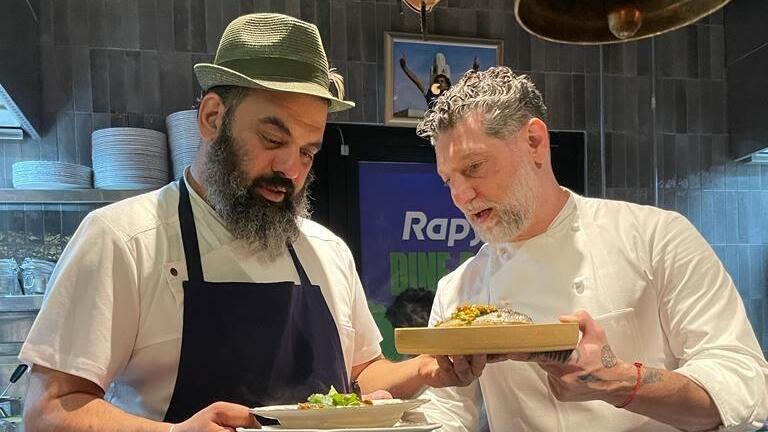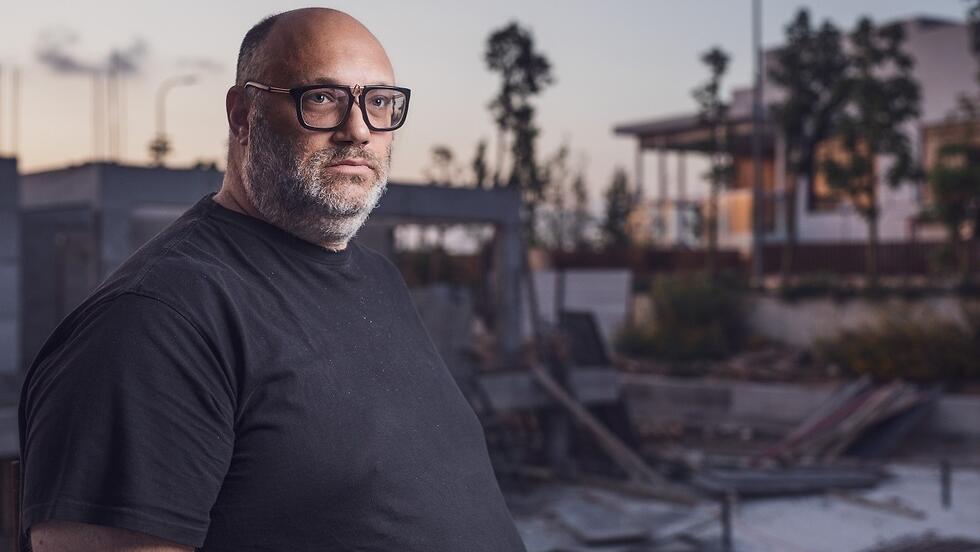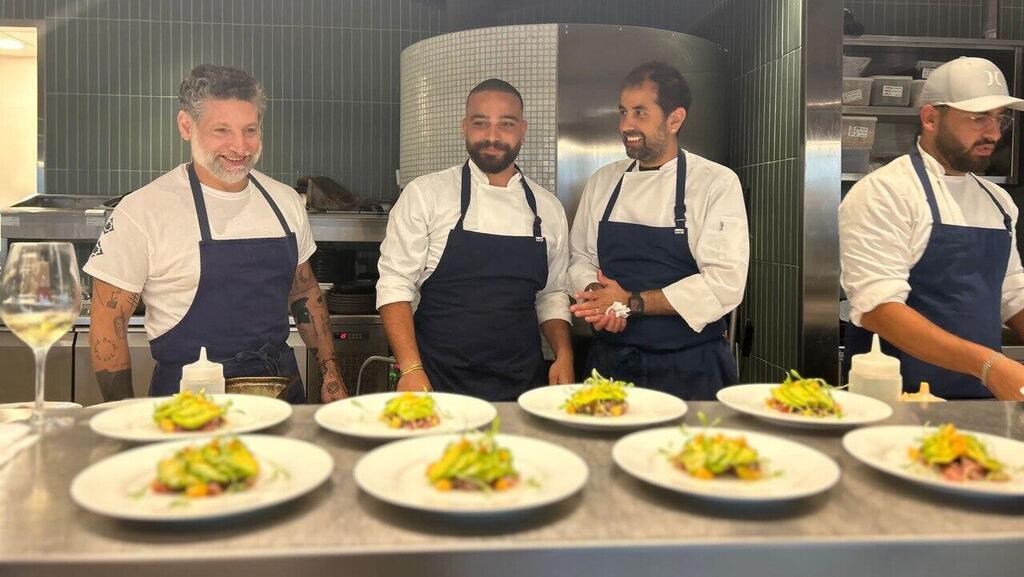Getting your Trinity Audio player ready...
Lunch at work can be dull – but it can also be prepared by a two-star Michelin chef. And no, this isn’t happening in some distant world; it's a regular occurrence for employees at Amdocs' campus in Rehovot. In recent years, the high-tech world has merged with the culinary scene, giving birth to a new breed of corporate dining.
Israeli star chef Moshik Roth leads this trend at Amdocs, Haim Cohen at Microsoft, Assaf Granit at Wix, Lightricks and Rapyd, Yarzin Sella at Meta (Facebook), and even Ruti Broudo is getting in on the action. This new style of dining – a mix between institutional kitchens and traditional restaurants – has also brought about new, sought-after roles in the culinary world, giving rise to high-tech chefs.
For the first time this past Passover, Shlomi, a chef at one of the country’s high-tech company kitchens, spent the holiday with his family. For the last seven years, he worked as a hot line chef at a popular restaurant in central Israel – working evenings, weekends and holidays, with only one day off per week.
This year, he got eight days off for Passover, not all deducted from his vacation quota. He finishes work early, picks up his two kids from school every day and spends his evenings at home with his family. Sounds like a dream? Maybe, but this is the new reality for chefs who’ve chosen to work in high-tech. Today, a chef position with Assaf Granit at Wix is more appealing than any restaurant job out there. And yes, the high-tech world’s perks have trickled into the kitchen.
“Passover break is a real break now and holidays are real holidays. When the campus is on break, so are the chefs. Being able to focus the team on their work and give them the rest they deserve instead of working them to the bone is one of the greatest blessings that’s ever happened to me,” said Chef Moshik Roth, who runs no less than eight restaurants at Amdocs' campus, feeding 1,000–2,000 people daily.
“At the end of the day, the Achilles' heel of every restaurant is its workforce, which works seven days a week. You need a double staff for that and it affects profitability. There’s no industry where it’s harder to find talent and new employees than in restaurants and kitchens today. Since the COVID-19 pandemic, many chefs have gone into private businesses or opened their own ventures, leaving the restaurant world.
“And then the high-tech world came in and took away a significant chunk of our talent. The conditions in high-tech are generally better, but as a chef, I can’t replace the passion for classical dining – that’s where my soul is, and that’s why I became a chef,” Roth said.
Delicious perks and benefits
Shay Kitches, 48, once owned the Baan restaurant near Tel Aviv, which has since closed, as well as a nearby pita stand that shut down at the start of the war in Gaza. During the war, with rising costs and a labor shortage in the restaurant industry, Kitches didn’t see a way to reopen his own eatery.
About six months ago, he became the chef at Wix’s Thai restaurant, part of Chef Assaf Granit and the Machneyuda Group's restaurants, which include four restaurants in the complex. Like all tech chefs, Kitches spent Passover on holiday with his family.
"The chefs here enjoy high-tech-level conditions," he said. "We have a gym, a barista serving free coffee all day and the chefs get to eat staff meals from all the employee restaurants. There are snack bars stocked with things like different types of cereal, dried fruits, chocolate and energy bars everywhere. Plus, there’s organized parking in the building."
The good life. What about working hours?
"From morning until afternoon. No chef here stays past 4 p.m. We work from Sunday to Thursday and that's it, which isn’t bad at all. For people with families or older folks, it’s amazing."
And the salary – is it at a high-tech level?
"Not less than what a restaurant chef makes, maybe even a bit more. The difference is that restaurant chefs can work double shifts, including Fridays and Saturdays, but they don’t here."
And what about the labor shortage? These new high-tech jobs seem to compete quite well with traditional chef roles.
"I haven’t had a shortage of chefs since I’ve been here; there's sometimes even a surplus."
Chef Mor Salem, 32, has worked at some of Tel Aviv’s most prestigious restaurants, like Haim Cohen’s Yafo Tel Aviv and Yaron Shalev’s ToTo, as well as other notable places like Tomer Agay’s Santa Katarina.
When not on reserve duty, Salem is the chef at the Similarweb dining complex, owned by Haim Cohen and Amit Kaufman’s Feed Your Mind company, which also handles dining for Microsoft and the Knesset. Currently, Salem is serving in Gaza as part of his third round of reserve duty since the war began.
"Chefs and cooks my age who are successful just want their lives back," Salem explained. "They want families."
And the salary?
"It’s comparable to what you'd earn in a restaurant. The difference is that, in restaurants, chefs can work overtime, and here they can’t. Tech chefs are people who got tired of the restaurant scene; they’re usually young parents in their early 30s and it suits them.
“They can also make extra income by doing private events after work hours or on weekends and it works for older folks too. I have three employees over 65 who are like soldiers – managing stations in a big, serious kitchen that feeds 500 people a day."
How do your weekends look now compared to before? It sounds like you've beat the system.
"When I worked at ToTo and Yafo Tel Aviv, I used to work every Friday and Saturday. People were out having fun and my work was part of their fun. Now I eat in restaurants on Saturday afternoons. And yes, it’s like beating the system because I’m doing what I love, earning a salary I’m happy with and enjoying myself. It feels like I’m not working."
Do the perks of the high-tech world trickle down to you in the kitchen?
"Ultimately, we’re their service providers. We’re also friends with them, talk about soccer and joke around with the employees, but there’s a separation – we’re their service providers. We’re not invisible, but the experience they have – like the gym, parties, or ice cream fridges – isn’t the chefs’ experience. Sure, we can use the gym, but we’re not eating ice cream all day."
With all these conditions, do you see yourself working in a restaurant again in the future?
"Definitely. I want to open my own restaurant, one with my DNA. I love Haim, but my generation also needs to sign off on menus."
First published: 08:31, 09.11.24





